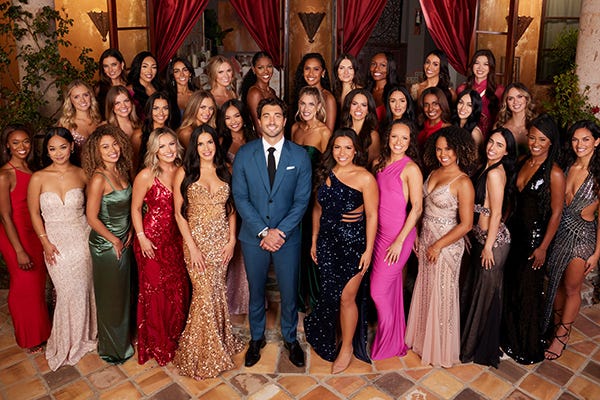Clues in Culture: The Fascination of Sleuthing in Music, TV, and Beyond
You don’t have to love mystery and crime stories to be an armchair detective!
A mystery can take many forms: a whodunit novel that has you guessing until the very end; an escape room with your friends where you have to work together to find your way out; a TV series procedural that follows a detective or investigative reporter. These forms of narrative storytelling tap into a human trait that everyone has: curiosity. We are constantly trying to find answers to our story questions, and presented with a mysterious situation, we turn into armchair investigators.
While I enjoy a good mystery page-turner now and then, and I will devour an intriguing limited series where you cannot trust anyone (hello, White Lotus and White Lotus 2), it’s not the genre I naturally gravitate toward. But I started to realize something about the fandoms I stand firmly in: a healthy amount of sleuthing is ever-present. It got me thinking: all of us crave a story full of intrigue where we are compelled to crack some kind of case or truth–it just might show up in some unlikely places.
Music came to mind first. It’s not a secret that Taylor Swift has developed a relationship with her fans in which she and her team drop clues and Easter eggs all over her videos, lyrics, websites and social media feeds to give fans insight into what new music or appearances might be coming, who a song might be about, what happened in the singer’s life to inspire a lyric, and other goings on. The Swifties call it “clowning,” specifically because their theories get crazier and the clues seemingly build up as they wait for confirmation of their hunches. And when it doesn’t come, or they’re wrong, they feel like, well, clowns. But it doesn’t stop them from theorizing another day or moving onto the next clue about her next move from Taylor herself.

But it goes deeper than predictions for what’s happening in the future. Ask any Swiftie who considers themselves a big fan and you’ll find that they have excavated Taylor Swift’s back catalog to find the story of her life. The narrative includes early relationships, the onset of fame, friendships that went bad (blood), a fall from grace and internet hatred, true love and heartbreak, a feminist self-discovery, business deals gone south, and superstar resurrection through her re-recorded masters. There’s enough content in Taylor Swift’s music catalog alone–even if you weren’t following the news media at the time of each album release–that would read like an epic novel dripping with hints about the last page if you read it over and over again.
And it’s not just Taylor Swift, of course. Many, if not most, musicians infuse their music with their personal experiences, so it’s up to the listener to delve in if they want to. Personally, I could listen to behind the scenes stories about the writing and recording of Fleetwood Mac’s Rumours album, released in 1977, all day.
Through each track, you discover these musicians writing about each other, falling in and out of love and hurting one another, and just trying to get through it unscathed. You can almost hear the band on the brink of breakup because of interpersonal conflict, though it never comes. It’s messy, dramatic, and of course, incredible fodder for one of the most famous and well-respected albums of all time. And it didn't stop with Rumours. Decades later, in 1997, the band filmed a performance of “Silver Springs,” a song Stevie Nicks is said to have written after her breakup with band member Lindsay Buckingham. Watching it feels akin to the moment a detective discovers the “smoking gun” piece of evidence in a TV series procedural: Stevie passionately sings the song while locking eyes with Lindsay, screaming the last bars of the chorus directly to him as if their breakup happened five minutes ago, as opposed to decades. We knew the ending for these two romantically, but watching this performance gives even more clues as to what might have been going on behind the scenes to lead to it.
Another genre, reality television, offers fans an entirely different way of sleuthing. Since reality show cast members often become famous in real life and have active social media accounts, and their shows are filmed months in advance, there is a lot of opportunity for the modern fan to play detective about what might have happened throughout the filming of episodes that haven’t aired yet. Almost every season of The Bachelor has fought against the very real probability that the ending gets spoiled, meaning, someone somewhere figures out who the lead chooses many weeks before the epic finale airs. Fans become acquainted with cast members, stalking their social media accounts and looking for evidence of what may have gone down in the interim between the end of filming and what they see on screen week to week.
The viewers also become detectives while watching the show: they look for specific types of producer edits that might sway the fandom one way or another in terms of who the winner might be, staying vigilant about what the producers might want them to believe through soundbites and music cues versus what might be true. True investigators of the show notice awkward camera cuts and set dressing mistakes that viewers weren’t meant to catch but change the real story slightly. It’s a cat and mouse game: the show wants fans to keep watching until the very last scene and feel surprised along the way, and the viewer both wants to be kept on the edge of their seat as they hope their predictions might be true and wants the glory of being able to sidestep the manipulation of the edit. This is how many competition shows operate, like Big Brother, Survivor, The Traitors, etc.: fans play gumshoe to hopefully, accurately, predict the best players and winners.
In one of the most fascinating and groundbreaking reality television moments of all time, Season 10 of Bravo’s Vanderpump Rules was wholly disrupted by scandal, or should I say Scandoval. (To put things in perspective: for the first time in the decade-long history of the show, not only were the dangerously low ratings fully revived, the show even won an Emmy Award.)
If you're the last person on earth who doesn’t know what happened, here’s the gist: The fandom was irrevocably shook in March of 2023 when series regular Tom Sandoval was revealed to be cheating on his series-long girlfriend of ten years Ariana Madix with their mutual friend and fellow cast member. If you’re unfamiliar with the scandal but know Ariana’s name, it’s not a surprise: this event put her in an international spotlight way beyond reality show stardom that included an overwhelming number of brand deals and partnerships, a stint on Dancing With the Stars, was cast as the lead in the Broadway musical, Chicago, for a limited time, and is set to host the next season of Love Island USA.
The real life revelation of the cheating scandal came after just a few episodes of the tenth season of Vanderpump Rules had aired, and most of the episodes of the season were, as they say, “in the can,” industry-speak for finished and ready to air. Viewers watched the drama unfold on the show through a lens the producers never in a million years thought they’d possess: a giant piece of external information that affects every member in the friend group on the show, and inescapably alters how every scene is watched from that new perspective. Reality television is supposed to be a bit of a ruse for the viewer; they’re not supposed to know the real life goings on behind the camera, but buy into the edit that has been decided for them. It’s “real,” but, not really. In this unprecedented case, not even the other cast members, producers, and editors knew the full story at the time of filming. The last few episodes of the season were edited after the news broke, allowing producers to lean into the biggest scandal on their show ever–and one that took over the wider cultural zeitgeist, bringing new fans to the show in droves. Viewers spent the entire season looking for “clues” of infidelity, (“receipts and reasons” as Taylor Swift sings in her song “I Did Something Bad,” if you will) and the result was an exhilarating experience of watching one thing while knowing another. A dream if you love a good mystery.
Another Bravo network scandal scenario played out in 2024 during the final few episodes of Real Housewives of Salt Lake City, when cast members discovered a huge secret about one of their own which threw absolutely everything viewers watched all season, as well as how the show is casted in the first place, into question. This got me thinking about a concept that I find fascinating: the idea of “rewatch value” when it comes to reality and scripted television. When you know the outcome of a season, it’s fun to go back and rewatch it again to look for “clues.” I had never watched an episode of RHOSLC (being a Housewives fan apparently means knowing the acronyms of all the franchises, so you can thank me for that) but I was definitely all in when I heard that the ending was out of the ordinary. Knowing a little bit about the scandal, I watched the entire season with that in mind and it had me looking for clues left and right. Fans who might have enjoyed it in real time as it aired didn’t have the benefit of knowing the ending, but now they can rewatch it with a completely altered perspective which keeps things fresh and interesting.
It’s the same for scripted TV, and not just mysterious shows where on first watch you truly had no idea what was going on (thinking about you, Lost). There’s something so satisfying about going back to watch a series all over again and noticing something you missed before, simply because you had no idea where you were being led the first time. In the Broadway musical Hadestown, based on the myths of Orpheus and Eurydice and Hades and Persephone, the chorus tells the audience in the opening number that the story they’re about to see–the song they’re about to sing–is an old one, a sad one, but that “we’re gonna sing it again.” If you know anything about ancient mythology, you absolutely know how this story ends (I won’t spoil it here if you don’t). But the musical reiterates that “singing the song again” or, telling the story over and over, makes one hopeful for a better outcome, or at least implies that wisdom of the ending will help us search for clues throughout so we aren’t quite so surprised. As humans, we want to catch those moments before we get got, even if it can be thrilling to be surprised.
The mystery and thriller genres will always have a dedicated audience. But I would encourage you to look for clues and Easter eggs in all of the content you watch and read. You just might be excited to find that every story is a mystery, if you really want it to be.
Want more? Head over to our Discord where you’ll find tons of other fans there chatting in our forums about the books, TV shows, movies, music, and games we all love! Don’t forget to follow us on Instagram, tumblr, and Spotify for more fandom content—and hit that subscribe button so you never miss a thing at rmrk*st!








